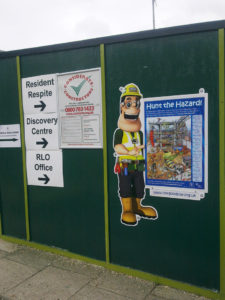
Mike Petter, Chairman of the Considerate Constructors Scheme’s Service and Performance Committee, discusses why councils and housing associations should take a considerate approach to construction.
The Considerate Constructors Scheme (CCS) has a clear and simple objective: to improve the image of the construction industry and encourage best practice beyond statutory requirements. The not-for-profit Scheme was established by the industry back in 1997 and has become the recognised force for improvement within construction. That’s a pretty important role, given that construction output was worth around £102bn to the UK economy in 2015 (representing 6% of the total output) [Construction industry: statistics and policy, House of Commons, 2016].
In the first quarter of 2015, 2.1 million jobs or 6.2% of the UK total were in the construction industry. Furthermore, the industry is forecast to grow by over 70% within the next 10 years. Great growth opportunities and playing a pivotal part in the nation’s economy are, however, met with steep and urgent challenges: construction faces a dearth of workers — over 230,000 more are needed in the next five years [Construction Skills Network Forecasts 2016-2020, CITB, 2016], women continue to be underrepresented, and there’s growing pressure on the environment in order to meet the demands of an ever-expanding population.
The industry recognises the Scheme’s impact in helping to tackle these challenges; so much so that many clients have made registration with the Scheme a tendering condition for a large number of publicly and privately funded projects.
How does it work?
The Scheme works through the voluntary registration of construction sites, companies, subcontractors and suppliers. These organisations agree to abide by the Code of Considerate Practice. They are monitored by industry professionals on their performance in three areas of the Code: consideration towards the general public, the workforce and the environment. Every year, the Scheme registers around 8,000 sites and makes over 15,000 site visits.
 By displaying Considerate Constructors Scheme posters around the site, companies can promote their registration. The posters also provide a name and telephone number of the site manager or company contact and a Freephone number of the Scheme’s administration office, should any passers-by wish to comment. Registered companies and suppliers can also display a vehicle sticker or magnet showing their unique registration number on every company vehicle used on the public highway.
By displaying Considerate Constructors Scheme posters around the site, companies can promote their registration. The posters also provide a name and telephone number of the site manager or company contact and a Freephone number of the Scheme’s administration office, should any passers-by wish to comment. Registered companies and suppliers can also display a vehicle sticker or magnet showing their unique registration number on every company vehicle used on the public highway.
Striving for better
The best performing sites and companies are recognised at the Scheme’s annual National Awards programme. The awards range from the top achievement of ‘Most Considerate Site’ ‘Most Considerate Company’ or ‘Most Considerate Supplier’, through to Gold, Silver and Bronze Awards. Being an award-winner is a real badge of honour and the achievement is highly revered across the industry.
Indeed, a number of housing associations have been successful at the Awards; only last year housing association Gentoo Construction scooped the top accolade of Most Considerate Site 2016 (in the project category of £5m to <£10m) for The Cheviots site — a construction of a 40-bed extra care home, alongside six new bungalows in Ashington, Northumberland.
Client partners
In addition to registering their individual construction sites, housing associations and local authorities can also demonstrate their commitment to considerate construction by becoming a Client Partner. Client Partners agree to recommend Scheme registration to all sites they control and are expected to encourage compliance with all aspects of the Scheme’s Code on their registered sites.
Current Client Partners from this sector include: Basildon Council; Kent County Council; Manchester City Council; Staffordshire County Council, Westminster City Council; Coastal Housing Group; First Wessex; Gedling Homes; Great Places Housing Group; Nottingham City Homes; One Vision Housing; and the Sanctuary Group.
Business benefits
There are a number of compelling cases for gaining CCS membership: it can often support winning new business and help with the planning process, by demonstrating commitment to adding social value, minimising inconvenience for local communities and disruption to the environment and supporting the Value for Money (VfM) requirements of the housing regulator. In many cases, registration with the Scheme is mandatory for some clients and the vast majority of major contractors register all of their sites with the Scheme.
The advice and guidance provided during site visits has been instrumental in helping construction sites to become more efficient, whether it is more effective communication with their workforce or developing stronger relationships with their supply chain.
 Sharing best practice
Sharing best practice
With over 19 years of experience in monitoring construction sites, the Scheme has collected a vast library of examples of best practice, which exceed the requirements of the Scheme’s Code. Examples come from a range of organisations and project sizes, covering huge billion-pound projects right through to small scale building works. In 2015, the Scheme introduced the Best Practice Hub to share these examples with the industry. Any organisation can use the Hub and once registered, can update it with their best practice examples, case studies and tips.
The next generation
The Scheme plays a vital role in making construction an exciting, challenging and rewarding place for the next generation of employees. The Scheme has developed two industry mascots: Honor Goodsite — a Structural Engineer; and Ivor Goodsite — a Site Manager. These costumed characters are used by construction companies, local schools and communities to engage with a younger audience to promote all that is positive about the UK construction industry as well as encouraging safety on and around construction sites. In 2016, around 23,000 children attended events hosted by these industry mascots.
The Scheme also works directly with secondary schools, colleges and universities and speaks to young people to get the message across that the industry offers great career opportunities — from skilled technical careers on site to fields including surveying, architecture, planning, finance, HR, marketing and management.








